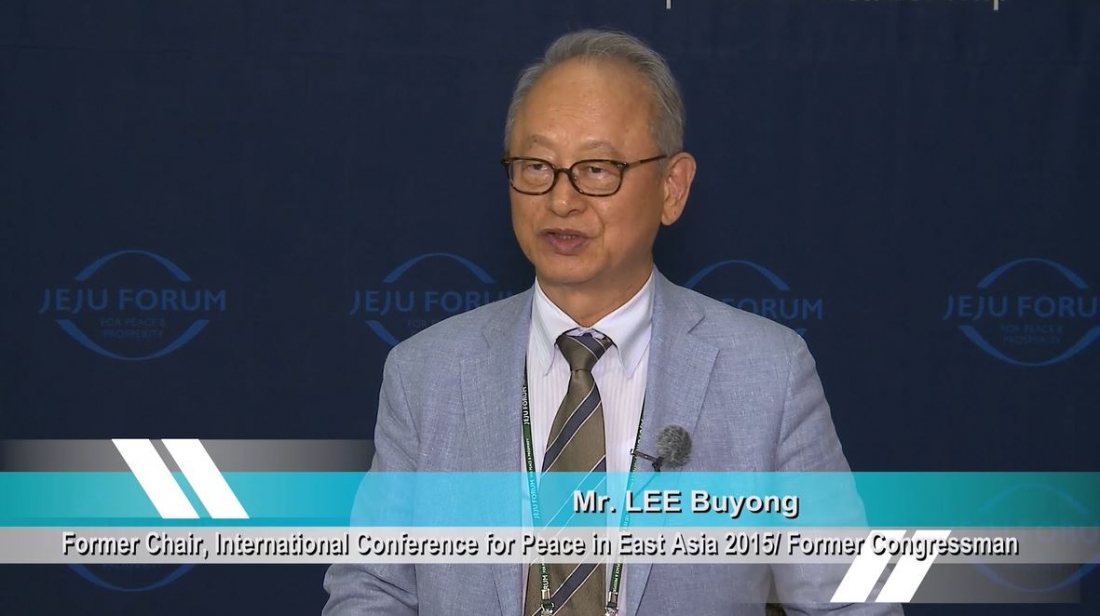
[Possibilities and Conditions of East Asia Peace Community]
Q1. What do you think of the “Korea process” in terms of handling North Korean nuclear issues and seeking peace on the Korean peninsula?
The situation on the peninsula is growing serious, especially as North Korea’s nuclear weapons and missile development grow further. The North Korean nuclear issue seems to be approaching to a decisive point. The U.S. needs to focus on simultaneous negotiations toward denuclearization and a peace system, and there should be no more passivity in South Korea’s posture.
Q2. In terms of Asia’s new order and cooperative leadership, the theme of “building a peace community in East Asia” has been considered for quite a long time. However, there have been relatively few advances to this end. Recently, the U.S. and China have been attempting to promote their own versions of regional community through, respectively, the TPP and the AIIB. In the current context, what would be a desirable or successful regional community?
It is unfortunate that there is no cooperative organization in East Asia, which is dangerous because of competing great powers and a divided North and South Korea. The U.S. and China are confronting each other, so it has as yet been impossible for the cooperative organization to appear.
The two great powers—the U.S. and China—have tried to promote their own regional communities into two proposed organizations: the U.S.-led Trans-Pacific Partnership (TPP) and the Chinese-led Asian Infrastructure Investment Bank (AIIB). Still in the initial stages, these organizations have begun as economic cooperation. Sooner or later, they will become security-oriented alliances centered on each of these two great powers.
As such, there should be some discussion among China, Japan, and South Korea, which have shared a common heritage historically. Going forward, we can include the U.S., Russia, Vietnam, the Philippines, and even Mongolia into these through civilian-centered networks.
Q3. The EU has been often referred to as a successful regional community. What conditions might form the basis of an East Asian version of regional community?
The discussion should not be concentrated on the centralization of great powers. The organization should begin at the grassroots level, through civil society, including academics, artists, and novelists. Then, gradually, this will bring forth a combined official and civilian network.
Sooner or later, we hope, the nuclear problem of North Korea will be resolved at the Six Party Talks. Then, the Six Party Talks organization will evolve into an official organization in East Asia. This will play a role for a future cooperative organization among nations in East Asia.
[On Peace]
Q1. What do you think is an effective approach for local government with regard to bringing in international organizations to Jeju as an “island of world peace”?
Former Japanese Prime Minister Hatoyama Yukio and Jeju Governor Won Hee-ryong suggested that Jeju Island and Okinawa Island could play important roles in developing an organization for East Asian cooperation. But these two islands are now stuck in the realm of conflict, not peace.
It is imperative that these two islands play a role in bringing forth a cooperative organization in this region for peace, not confrontation. In the past ten years, Jeju has gained the experience to make this kind of organization for peace, so we can expect Jeju to be the center of a future peace organization in East Asia.
Q2. How can multilateral talks such as the Jeju Forum contribute to peace promotion?
The Korean peninsula is surrounded by big powers, but right now the peninsula is suffering from division. The most important thing now is North Korea’s nuclear weapons development program. If the Six Party Talks successfully resolve North Korea’s nuclear issue, there would be no alternative but Jeju Island to host the regional organization of peace in East Asia. Jeju is the most suitable place because even though the Japanese, Chinese, or even Russians may want to host such an organization in their homelands, the other countries would not be happy if another great power were to host the organization.
* Mr. LEE Buyong is the Former Chair of the International Conference for Peace in East Asia 2015.
A cooperative organization for peace is necessary because of the increasing danger between Northeast Asian nations, says Mr. LEE Buyong. The situation on the Korean peninsula is growing serious, largely due to North Korea’s nuclear weapons and missile development. More generally, he says, the Sino-U.S. confrontation will lead to future confrontation, even though both of these two great powers have tried to promote their own regional communities (the TTP and the AIIB).Mr. LEE suggests that East Asian regionalism must begin at the grassroots level through civil society networks, and gradually build to include a combined official and civilian network. At that point, the Six Party Talks could form the basis for a future cooperative organization among nations in East Asia. He believes that Jeju would be the most suitable location to host such an organization because of its political and geographical distance from larger powers such as Japan, China, and Russia.
* Interviewed on May 27, 2016 (Jeju Forum 2016)
Posted on November 25, 2016
